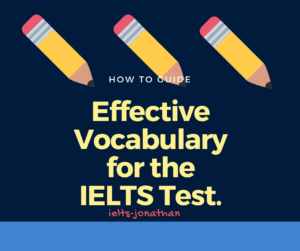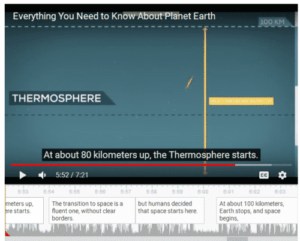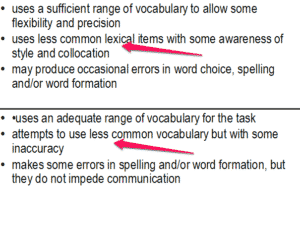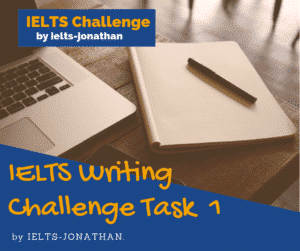IELTS Vocabulary or Vocabulary
IELTS is a high-stake exam and out of all the skills and techniques you need to succeed in the IELTS test, the ability to access vocabulary is one of the most important.
First of all, it is a 25% feature of the Band Score in Both Speaking and Writing Task 1 and Task 2.
The amount of vocabulary you know also has a direct influence on your Listening and Reading Band as they actively test, among other test items, your vocabulary level too.
So having access to a wide range of vocabulary is vital for a High Band Score.
What are student issues with learning vocabulary?
So we know that it’s important to your Band Score, but learning vocabulary is often quite a challenge to students for a variety of reasons.
Common questions are:
How do I learn IELTS vocabulary?
What vocabulary do I need to learn for IELTS?
And students often get stressed or complain they
Don’t have the time
Don’t have the motivation
Can’t remember vocabulary
What solutions are there to learning vocabulary or IELTS vocabulary?
First of all, let me say there is no easy answer to learning vocabulary, BUT don’t give up just yet!
To make the process easier it’s important to consider these questions.
Q – Why I am learning vocabulary?
A – You need to understand why you are learning vocabulary – for the exam – for pleasure – this will help with motivation and avoid procrastination.
# You need a strategy.
You need to understand why you are learning vocabulary –
Are you learning only for the exam – are you learning for pleasure – are your learning alongside General English.
Divide your study time between focussed IELTS practice where you will acquire vocabulary and Learning for pleasure.
Be clear about your intentions – and consider the long term goal.
It’s hard work but it will be worth it.
Q – What vocabulary am I learning?
A – You need to understand the vocabulary you are learning – is it general – formal – topic specific – useful?
This will make learning more efficient.
# You need a plan.
Things to consider about vocabulary are, is it suitable for writing or for speaking, are these good and common collocations used by native speakers?
A plan I suggest to my Students is..
Plan what you going to do, and stick to it! Use…
For example, today when I watch the film on Netflicks, I will note some informal expressions I don’t know and check the meaning.
Here’s a good tip!
Use the YouTube typescript feature to follow the conversation of a native speaker about a topic you enjoy.
Follow a TedX Talk, and make notes about the overall gist, as well as new vocabulary.
It’s not necessary to understand every word to understand the ideas.
Other Ideas
Practice ways to describe graphs using adjectives or adverbs.
Read an official IELTS test and check my overall understanding.
Pick ten words at random that you’re not sure of and note them down.
Follow a Facebook page, like mine, and use the posts to acquire vocabulary.
Q – How can I access vocabulary for IELTS
A – You need to understand what are the best resources and how to use technology effectively, when to study for IELTS or for pleasure. This will minimise wasting your time
# You need a study plan.
Use a Planner, and do some practice activities a month, a week and a day before the test. I’ve provided one here for you.
Note that I recommend using genuine materials that test the real skills needed for the IELTS test.
Here is my study plan related to resources available on the WEB. (Coming Soon)
You don’t need to use my plan, you can create your own.
Q – What is the best way to learn vocabulary?
A – You need to understand what to do with new vocabulary you find and how best you can remember it? This will make your learning more effective
# You need a method.
To be honest, this depends on the individual, but there are tried and tested methods that good teachers encourage students to do.
Read it, write it, review it.
A vocabulary note book is a good idea at whatever level of English you are, even for native speakers.
Recording a word or group of words in a notebook gives you the opportunity to review it at a later date. You stand a much better chance of remembering it, and being able to use it.
When I learnt a language, I used to just jot down words on scrapes of paper, and informally reviewed the words when I had a moment free.
Nowadays, you can acquire good vocabulary from so many apps, for example, Podcasts on any subject, as well as the more traditional mediums such as reading for pleasure, TV programmes and documentaries.
Films, however, because they are visual, tend to be limited in vocabulary and so not the best method for learning words.
Of course, with the internet you can now watch the BBC in the UK or national TV in Australia and New Zealand and US East and West coast television.
The same applies to radio stations.
I hope that you will be able to find the answers and general strategy from the following pages and the study tips and links I provide.
I am also putting together a bespoke study plan linked to freely available resources.
Join my Facebook group and subscribe and get notifications of when they are posted.
What makes good vocabulary?
Well, the answer to this question is certainly not words in isolation.
Below are my tips and strategies for vocabulary…
Collocations
Learning and Using Collocations
Used skillfully, collocations can improve both your writing and speaking scores and also help you in the reading and listening sections.
So what are they exactly?
You’re probably already familiar with collocations from text books used for studying English. They are the 2 or 3 words that commonly go together and appear correct to a native speaker. ‘go to school’ is probably the first one you ever learned!
On the opposite scale, when used incorrectly they can appear strange to a native speaker.
Other Basic Examples
go home, go shopping, spend time, spend money, watch a film, watch television – the lists go on..
Why are collocations important?
Collocations are a feature of the marking criteria in both the Speaking and Writing section! Collocations come under the criteria ‘Lexical Resource’ Here are the Band 7 descriptors.
The difference between a Band 6 and Band 7 is that Band 6 attempts to use sophisticated vocabulary while Band 7 uses sophisticated vocabulary well and with understanding.
It is not enough to just use some common collocations because you are marked on how you can use collocations effectively.
Read my post on Why collocations are worth learning.
I am preparing a Basic Writing Improvement Plan which applies to other IELTS skills as well.
Subscribe for notification of when it’s ready
More of my posts on collocations and links too.
List of collocations – Over 40 pages of academic collocations as a PDF
50 Useful Academic collocations
A handy Collocation Checker – Just the word
SKELL – helps you find words that go together and synonyms
Find the word you need with Netspeak – read the instructions first!
Synonyms
How can Synonyms improve my Band Score?
Synonyms are words that have the same or closely related meaning as another word.
English has a larger vocabulary than many languages, so naturally there are many synonyms.
Synonyms reduce the need for repetition in English and some say add colour to the language.
Synonyms feature heavily in the Listening and Reading Test and you need to display your knowledge of these in both the Writing and Speaking Sections.
children/kids – go/drive/walk – speak/talk/say – ill/sick/poorly
All the above have similar connotations, but are slightly different in meaning.
How to Learn Synonyms
It is unnecessary to specifically study synonyms.
However, it is important to build a varied vocabulary.
The most efficient method is to use a dictionary and my tips to record vocabulary at the end of this article.
Good dictionaries provide synonyms that are closely related.
Make the most of Synonyms for a Higher Band Score
Improving your vocabulary by paraphrasing, and improve your IELTS Score
When to paraphrase and why, and when not to!
Vocabulary is not just the vocabulary you know, but also how you are able to use it.
I’ve examined carefully the marking descriptors for IELTS Writing Task 1 and 2 and IELTS Speaking and LEXICAL RESOURCE is a feature of both parts.
One criterion for a higher band is ‘skilfully uses uncommon lexical items’ and another is ‘sufficient range of vocabulary to allow flexibility and precision’.
You can easily impress the examiner and increase your IELTS Band in IELTS Writing by paraphrasing.
Vocabulary development and Paraphrasing
But I need vocabulary for IELTS Writing Task 2!
IELTS Task 2 Topics
As a teacher I understand why students focus on questions like ‘What are the most common IELTS Writing part 2 topics?’
They are likely to be under pressure and are worried they will be unfamiliar with the test topic and therefore won’t have any relevant ideas
As always the kind of vocabulary you learn can help you in not only the Writing Task 2, but also the Listening, Reading and Speaking Test.
A strategy for vocabulary is to study both selectively and study widely.
Let’s focus on Selective Study.
Are the Writing Task 2 topics repeated?
There are a large amount of topics that can feature in Writing Task 2. I’ve seen over a 100 topics suggested on some websites.
However I have looked at sample tests, examined the most popular themes in commonly used classroom textbooks and spoken to other IELTS teachers and we agree that prominent core topics are generally repeated in a cycle.
IELTS Essay Topics
There are 10 general topics that come up more often than all of the rest put together. They cover:
- Health
- Environment
- Education
- Technology
- Globalisation
- Development
- Transportation
- Criminal Justice
- Youth Crime
- Government Spending
(source sample texts/published textbooks between 2015 -17)
Follow my link to articles arranged by topic for further practice.
Is there a style of writing for Task 1 or Task 2.
In both Task 1 and Task 2 the writing style should via towards an academic style of writing, therefore, slang, abbreviations and idioms should be avoided especially if you’re not certain of the idiomatic meaning.
Using slang or idioms can affect the lower the tone of your writing and make the writing sound inappropriate.
Using bullet points and contractions can affect the format and style of the task.
If excessive, contractions are used then this can again affect you Band Score.
There best language is one that uses accurate collocations, appropriate synonyms and style that approach academic language.
These are the best sites I’ve found for academic language practice.
Academic Vocabulary
Academic Word List – the most frequent word lists and sublists
Academic Word List – all word forms (nouns, verbs, adjectives, adverbs)
Compact version of the Academic Word List – a printable version.
Academic Word List Quizzes – good quizzes.
Academic Word List Practice Exercises – plenty of opportunities to practice.
Academic Phrase Bank – from Manchester University.
Phrasal Verbs and Formal synonyms
A-Z of formal and informal synonyms – the Plain English Campaign
Writing for a Purpose British Council
Using Vocabulary for Writing with the British Council
4 Steps to Success
- It’s important to improve your vocabulary for each topic.
Improving your vocabulary for each topic will help you in three ways.
Having the relevant vocabulary will help you generate your ideas and so help with Task achievement (presents an overview with information appropriately selected).
This will also make your ideas clearer (uses cohesive devices well) and demonstrate to the examiner a high level of vocabulary (sufficient range of vocabulary).
Many students fail to provide sufficient or appropriately used vocabulary and their band score is reflected in this.
When looking at a topic it is important to record new vocabulary correctly so you build up a bank of words internally. When you see new vocabulary in a reader, article or passage
- try and predict the meaning from the context
- then look at the sentence to see how the word is connected to other words.
- before you check the meaning in a dictionary
- finally, record the word in some way for future reference.
I personally use a notebook, but some apps allow you to make electronic notepads, and you might already have an established method.
What is important is that you note the word and THEN review it.
To be able to use a word effectively it needs to be reviewed at least three times before it can be practiced.
Don’t just make a list and abandon it.
- Focus on a topic
Like any good textbook or school syllabus, vocabulary is presented within a theme so it’s important to spend some time focussing on general topics.
Use my list of popular topics and find a reading and a listening activity, for example, a newspaper article and a podcast related to the topic.
Then follow it up with a related TASK 2 writing question or look at some sample materials and note some vocabulary and the MAIN ideas.
If you attend class, discuss with another student or join my Facebook and find a Study Buddy.
The main ideas for IELTS learning here are
Topic awareness– Vocabulary acquisition – Skills practice.
- Reading and listening widely
If you are fortunate enough to attend class it is still important to practice at home.
My tactics have always been’ little and often’ and 30 to 60 minutes focussed activity per day can make a significant difference to your overall score.
If time is limited, whatever you can do is valuable.
If you study smart this will focus on all four language skills and familiarise you with the common topics at the same time.
It’s a good idea to look at some sample materials from IELTS but it’s a bad idea to rely only on these materials
Actively look for articles on the common IELTS topics and note good vocabulary, listening to topics on the radio or podcasts is also useful and you often find that programmes are grouped by theme.
I regularly post articles relevant to IELTS candidates on my Facebook page on Thursdays and Sundays. I’ve also collected a bank of reading resources here.
Finally,
- Expose yourself fully to English
Focussing on topics is a strategy that will best prepare you for IELTS, but it is not enough to consider topics alone.
To be truly effective in IELTS you should gain as much exposure to the language as possible.
Try to read for pleasure and spend some time listening to the radio or podcasts – you don’t have to understand every word, but the more you actively read and listen, the more you will more easily be able to
- read more quickly, predict content and select the correct answers
- listen efficiently and spell the words that you hear
- write more effectively, and have relevant ideas
- speak more confidently on a range of topics
Again, when you encounter a word you don’t know, note it and check the meaning, collocation and synonyms and review it so they become part of your vocabulary
Useful apps
For Android and Apple here is a list of Note Taking Apps
‘HelloTalk’ is a great way for students to use and develop their language skills whilst also teaching their own language. The app now has more than 10 million users and a great range of tools to help make the interaction between learners meaningful as a learning experience.’ (Nik Peachey EdTech Newsletter)
However, my personal favourite is PENZU. It reminds you to enter notes and also review the notes you have made!
Further Resources
Learning resources related to IELTS
Popular Topics Featured in IELTS
Find further resources to vocabulary below use the search box at the bottom to find answers.
Increase your IELTS TASK 1 Band Score with Adjectives and Adverbs
Comparing and Contrasting Language for IELTS Task 1
Working Correctly with Numbers for IELTS TASK 1
Describing Changes and Trends
Useful sites for IELTS Vocabulary
Finally, you can go over to my Facebook page and join thousands of other students who are working towards the test.
Every time I see a useful article/video/app/website/post to help you prepare for IELTS, I post it on my Facebook page.
If you don’t have Facebook you can sign up to my newsletter where I send out a summary of all the useful posts.
Some of these materials are only available in Facebook, but wherever possible, I have put the link to the original website page.
Please let me know if you find anything useful that you think I should add!
Join my IELTS WRITING TASK 1 group here, for free practice.
All the Best,
Jonathan





















